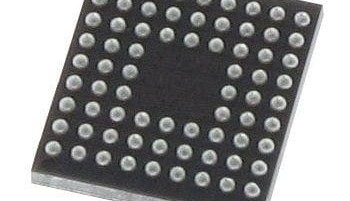Analog Devices ADuCM4050 Microcontroller, Now at Mouser, Offers Significant Power Savings for IoT Edge Nodes
on

October 15, 2018 - Mouser Electronics, Inc., the industry's leading New Product Introduction (NPI) distributor with the widest selection of semiconductors and electronic components, is now shipping the ADuCM4050 microcontroller from Analog Devices. The ultra-low-power device features integrated power management and SensorStrobe™ technology to enable exceptional system-level power savings for extended battery life in Internet of Things (IoT) edge node applications.
The Analog Devices ADuCM4050 microcontroller, available from Mouser Electronicor, is based on an Arm® Cortex®-M4 core with floating-point unit, 128 Kbytes of embedded SRAM, and 512 Kbytes of embedded flash memory. The device offers a collection of digital peripherals, including three SPI interfaces, two UARTs, and an I²C interface, plus up to 51 programmable general-purpose input/outputs (GPIOs). The microcontroller's analog subsystem provides clocking, reset, and power management capabilities, as well as a 12-bit successive approximation register (SAR) analog-to-digital converter (ADC).
The ADuCM4050 offers class-leading 40μA/MHz active-mode consumption (680nA in hibernate mode) for IoT applications where power consumption, security, and robustness are key requirements. The microcontroller features AES 128/256, SHA 256, block ciphers for code protection, key wrap, and hash message authentication code (HMAC) encryption to provide stronger IP protection and better defense against malware and misuse.
The ADuCM4050 microcontroller targets applications that require long battery life as well as security and performance integrity. To help devices achieve long battery life, the microcontroller incorporates SensorStrobe technology, which enable the device to collect internal and external sensor data during hibernate mode. This low-power, efficient sampling saves significant power over the long term.
To learn more, visit www.mouser.com/adi-aducm4050-ulp-mcu.


Discussion (0 comments)